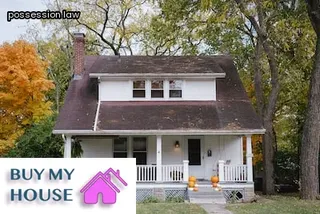Squatting is the act of occupying an abandoned or unoccupied property without permission from the owner. It is a form of tenancy that is illegal in most states, including Connecticut, as squatters do not have any legal rights to the property.
Squatting can be quite damaging for both the property owner and the squatter. Property owners are put at risk of having their possessions stolen or damaged, while squatters can face eviction and criminal charges if caught.
To avoid becoming a squatter, it is important to abide by all state laws relating to real estate and make sure to get written permission from the property owner before entering and occupying any premises. Additionally, people should always look into local ordinances to ensure they are not unknowingly breaking any laws.
Finally, staying informed about property rights is key in understanding what constitutes legal occupancy and what does not.

Property owners in Connecticut have a right to protect their property against squatters. Connecticut law allows homeowners to take specific steps to ensure they can assert their legal ownership rights over the squatter.
This includes filing an eviction or a special detainer action, and if necessary, filing a complaint for trespassing with the local police department. Property owners should also be aware of any laws that may apply to their specific situation; these laws vary by town and municipality, so it is important to check with your local government or attorney before taking any legal action against a squatter.
Additionally, property owners can take proactive measures such as installing locks and surveillance cameras on their property, informing the squatter in writing of their rights on the property, and having all relevant documents concerning ownership readily available for future use. Taking such measures can help property owners protect their rights and avoid costly legal disputes with squatters down the line.
When it comes to protecting yourself from unlawful occupancy of your property, understanding the rights of squatters in Connecticut is an essential part of the process. Knowing when a squatter has established lawful residency on your property and what steps you can take to protect yourself can help ensure that you are not taken advantage of by an individual looking to take unauthorized possession of your land.
It is important to understand that squatters may be entitled to certain rights even if they do not have permission to occupy your premises, so it is best to familiarize yourself with the laws surrounding this issue before taking any action. Additionally, staying aware of any changes in local ordinances or statutes related to squatting can further protect you from potential legal issues down the road.
Understanding these rights and regulations can help you protect yourself from unlawful occupancy and make sure that your property remains secure for years to come.

Evicting a squatter from a property in Connecticut can be complicated, as there are specific laws and regulations that must be followed. It’s important to understand the rights of a squatter before proceeding with any eviction process, so that you don’t end up facing legal complications down the line.
Generally speaking, if the squatter has been living on the property for more than 30 days without permission or payment, they may qualify for certain tenant protections under the law. To begin an eviction process, you must first provide written notice to the squatters informing them of their unlawful occupancy of your premises and give them time to vacate the property.
If they do not leave by their deadline, then you may file an Unlawful Detainer suit with your local court. Keep in mind that you must also follow certain procedures depending on your region, such as providing proof of ownership and service of process.
Once these requirements have been satisfied, then a judge will decide whether or not to issue an eviction order based on all relevant evidence and arguments presented in court. It is always best practice to consult with an attorney before beginning any type of eviction proceedings to ensure any potential legal issues are avoided or mitigated.
Knowing when to seek legal assistance with squatters is a critical step in understanding your rights in Connecticut. In some cases, you may be able to resolve the issue without involving lawyers, but in more serious matters it's important to know when outside help is necessary.
Depending on the situation, this could include setting up a formal eviction process or even filing a lawsuit. Before taking any action, familiarize yourself with local laws and regulations as they apply to squatting so that you can make an informed decision about the best course of action for your particular situation.
Additionally, look for resources that provide information about how to handle disputes with squatters and what options are available if the dispute escalates. Finally, if you find yourself in need of legal advice or representation, contact an attorney who specializes in real estate law to ensure that all of your rights are protected.

Squatting is a complex issue, and Connecticut is no exception. To understand the key elements of squatting laws in Connecticut, one must first understand who qualifies as a squatter and what rights are in place to protect them.
Generally speaking, to be considered a squatter in Connecticut, the individual must have taken possession of a property without permission from the lawful owner and have remained there for an extended period of time. Squatters have certain rights under Connecticut law; most notably, they cannot be ejected from their residence unless proper eviction procedures are followed.
Additionally, if the squatter meets certain criteria—such as proving they occupied the property for more than 15 years—they may apply for adverse possession and gain title to the property. Furthermore, squatters are protected by laws that limit landlords’ ability to enter or inspect their dwellings without notice or consent.
Finally, Connecticut’s criminal code also provides specific protections against harassment or intimidation of squatters by landlords or other occupants of the premises. Understanding these key elements of squatting laws in Connecticut can help individuals navigate their legal rights when it comes to occupying another person’s property without permission.
If a property owner ignores the presence of a squatter on their property, they could face serious legal consequences. In Connecticut, squatters can establish legal rights to a property if they have resided on it continuously and in good faith for fifteen years or more.
This means that if the occupant is able to prove they have been living in the house and paying taxes on it for at least fifteen years, they will be given the right to remain on the property. Ignoring a squatter could lead to costly litigation as well as unexpected financial obligations such as back taxes.
Additionally, evicting a squatter without due process may result in criminal charges for trespassing or breaking and entering. It is important for property owners in Connecticut to understand their rights and obligations when dealing with a squatter in order to avoid any potential issues down the line.

Adverse possession laws in Connecticut are complex and nuanced, so it's important to understand them before attempting to act on, or defend against, a squatter's rights claim. Adverse possession is a legal principle that allows someone to acquire ownership of a piece of land if they have openly occupied it for a certain period of time.
The amount of time needed to establish adverse possession varies, but in Connecticut the continuous occupation must be for 15 years or more in order for an individual to claim ownership. In order for adverse possession to take effect in Connecticut, the squatter must demonstrate exclusive physical control over the property and color of title, which legally establishes their claim as valid.
It is also necessary for a squatter to prove that they actively used the property as if it were their own by paying taxes on it and making any necessary repairs and improvements. If these requirements are not met, then the adverse possession claim may be successfully challenged by the rightful owner.
There are also certain defenses available to the rightful owner such as prescription or mistake of fact that can be used to rebut an adverse possession claim. It is critical to know all applicable laws and defenses when dealing with squatters' rights in Connecticut in order to make sure that everyone's rights are respected according to state law.
When a squatter in Connecticut is claiming title to the property they are living on through adverse possession, there are legal remedies available for disputing the title claim. In order to make a successful claim, the squatter must have met all criteria set out by Connecticut law.
This includes occupying the land for at least 15 years or more and notifying the rightful owner of their occupation of the property. If these conditions have been met, then there may be a legal dispute over whether or not the squatter has gained title to the property.
It is important that anyone pursuing this type of action consult with an experienced lawyer who can advise them on how best to proceed in their case. Additionally, it is important to understand what kinds of evidence may be necessary in order to prove ownership of a disputed property, such as any paperwork related to an earlier sale or transfer of ownership, public records related to taxes or liens on the land in question, and other documents that may demonstrate ownership rights.

In Connecticut, it is important for property owners to understand their statutory duties when encountering squatters on their property. By law, a property owner must make a reasonable effort to inform the squatter that they are trespassing or occupying the owner's land without permission.
A property owner must also post a visible notice informing the squatter of their rights and responsibilities as a trespasser. It is important to note that a squatter may not be evicted unless they have been given proper notification of their legal status as a trespasser in accordance with state laws.
Additionally, any attempt to remove the squatter by force or threat of force is illegal and can result in criminal charges being brought against the property owner. Furthermore, if the squatter has made improvements to the property, such as building structures or installing utilities, then they are entitled to compensation from the landowner.
Understanding these statutory duties will help ensure that both parties are fully informed of all relevant legal rights and obligations in Connecticut.
Yes, there are squatters rights in Connecticut. Squatters rights, or adverse possession, is a legal concept that allows for the acquisition of title to a property without any action taken by the original owner.
In Connecticut, these laws are set forth in Conn. Gen.
Stat. § 52-575 and provide an opportunity for individuals to gain title to unoccupied land if they meet certain criteria.
To successfully establish squatters rights in Connecticut, the person claiming the property must have “actual, exclusive and continuous possession” of it for 15 years or more. This means that they must not only occupy the land but also use it as if they owned it, such as paying taxes on it and making improvements to it without interruption during that time period.
Furthermore, their claim must be open and notorious—that is, visible to the public—and not hidden from view so that the true owner would have knowledge of it. If all these conditions are met and no action is taken by the original owner within 15 years, then squatter's rights can be established in Connecticut and ownership transferred from one party to another without any court order or other formal proceedings taking place.

If you have a squatter living in your Connecticut home, it is important to understand the process for evicting them. The first step of the eviction process is to properly identify the squatter.
Squatters are people who live on another person’s property without permission or legal right. It is important to determine if the individual is a tenant or a trespasser.
If they are a tenant, different rules and procedures apply than if they are a trespasser. After you have identified the squatter as either a tenant or trespasser, it’s time to begin eviction proceedings.
This includes giving proper notice depending on which category the individual falls into: tenants must be given 30 days’ notice while trespassers must be given 24 hours’ notice before legal proceedings can begin. After this period of notice has passed and the squatter does not vacate your property, then you may file for an eviction hearing with your local court system in order to receive an eviction judgment from a judge and legally remove the squatter from your home.
In Connecticut, the least amount of time that qualifies a person as a squatter is three years. This means that if a person has lived on a property for at least this length of time without permission from the owner, they may gain squatters rights to the property.
Squatters rights allow persons to stay on and use the land even though they do not have legal title or permission from the owner. To be eligible for squatters rights in Connecticut, it is essential to meet certain criteria, including living on the property for more than three years without interruption and having no intent to return possession of the land to its rightful owner.
Understanding these requirements can help ensure that individuals are aware of their legal rights and obligations when it comes to occupying another’s property.
Adverse possession, or the acquisition of a property through squatting, is a legal process that can take several years to complete in Connecticut. While the exact length of time varies greatly depending on the specific situation, it typically requires squatters to possess and use the property for a minimum of 15 years in order to establish ownership.
Furthermore, they must prove that they were openly occupying the property without permission from the rightful owner and without payment of rent or taxes. In addition, squatters must also demonstrate that they have been using the property as if it was their own by making permanent improvements such as building fences or other structures.
It is important to note that adverse possession laws vary from state to state, so those considering using this method should thoroughly research Connecticut's requirements before trying to gain ownership of a property.